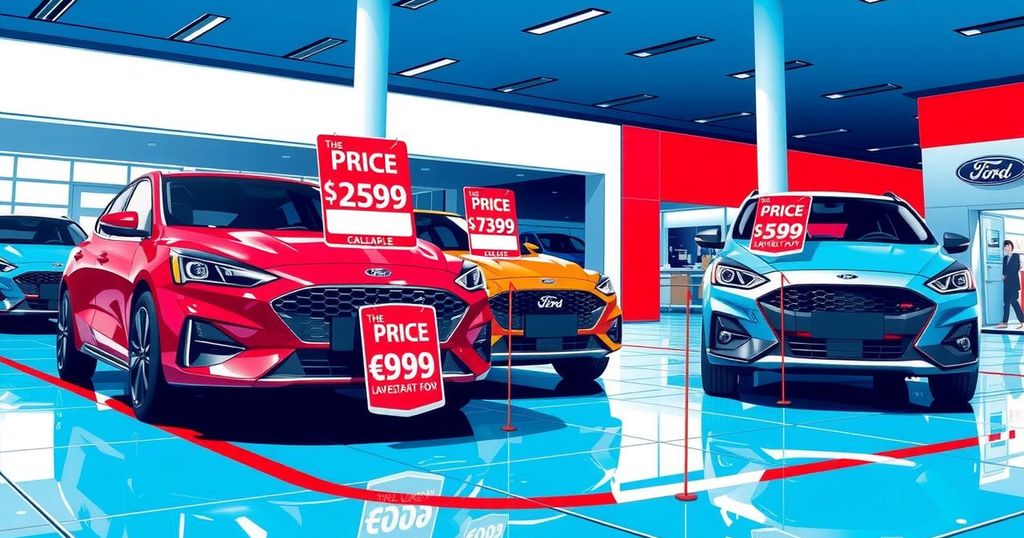Ford Announces Price Hikes on Vehicles Due to Trump’s Tariffs

Ford Motor Company has announced a price increase for three vehicles produced in Mexico, driven by tariffs imposed by the Trump administration. The Mustang Mach-E, Maverick, and Bronco Sport will see price increases of up to $2,000. The changes will affect cars produced after May 2, with deliveries to dealers expected in late June. Ford anticipates significant costs from tariffs in the coming years while maintaining a strong domestic manufacturing base.
Ford Motor Company, reacting swiftly to recent tariffs on auto imports imposed by the Trump administration, has decided to increase prices on three vehicles manufactured in Mexico. This change marks one of the initial adjustments by a major automaker in response to the tariffs that are expected to impact consumers significantly. The new price structure, reported first by Reuters, will take effect on vehicles produced after May 2, with delivery to dealer lots anticipated in late June.
Specifically, the prices for the Mustang Mach-E electric SUV, the affordable Maverick pickup, and the Bronco Sport will rise by as much as $2,000 on certain models. Ford confirmed that dealers have been informed of the new pricing through internal communications seen by Reuters. According to Ford, the company estimates that tariffs could add around $2.5 billion to its costs by 2025, although they expect to mitigate this by about $1 billion.
General Motors recently echoed similar concerns regarding tariffs, projecting costs between $4 billion and $5 billion due to the new levies. However, GM believes it can offset some of these expenses by approximately 30 percent. The uncertainty caused by the tariffs has led many automakers in both the U.S. and Europe to halt forecasts, shift production strategies, and even temporarily close plants.
After facing significant backlash from the automotive sector, President Trump did ease some tariffs on foreign auto parts, allowing manufacturers credits for domestic production. Nonetheless, the 25-percent tariff on the eight million vehicles imported annually into the U.S. remains intact, continuing to create challenges for auto manufacturers.
Ford holds a relatively fortuitous position amidst this pricing pressure; around 79 percent of its vehicles sold in the U.S. are assembled domestically, a much higher percentage compared to General Motors, which relies on domestic assembly for about 53 percent of its U.S. sales. This domestic manufacturing base may provide Ford with a cushion against fluctuating tariff impacts relative to some competitors.
However, Ford and GM both face hefty levies on imports from other countries, including China and South Korea. General Motors has assessed that their costs associated with Korean imports have reached approximately $2 billion. Meanwhile, Ford has opted not to specify its expenses related to importing vehicles from China. This situation illustrates a broader trend: automakers depending heavily on imports are feeling the pinch of rising costs.
Until now, Ford’s price hike was somewhat of a first among major automakers, as many had warned about potential increases but had yet to implement them. Porsche has also indicated that it may need to raise selling prices if tariffs remain, while Audi from Volkswagen has hinted at needing to increase costs without providing specific numbers. In contrast, BMW has suggested a more optimistic outlook, predicting a reduction in U.S. car tariffs by July.
In light of these circumstances, GM’s finance chief, Paul Jacobson, expressed confidence regarding pricing stability, asserting that the company feels secure about the current pricing landscape and does not expect immediate increases.
In summary, Ford’s recent decision to raise vehicle prices reflects the immediate impact of tariffs under the Trump administration. The increases affect popular models like the Mustang Mach-E and Maverick pickup and come amidst forecasts of rising costs across the industry. While some automakers may express optimism about future tariffs, the ongoing tensions in trade continue to create uncertainty, impacting pricing strategies for many carmakers.
Original Source: www.aljazeera.com




